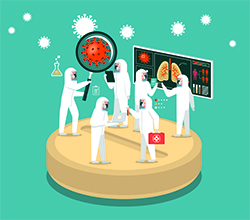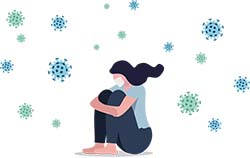Research & Innovation
 From the earliest days of the COVID-19 pandemic, researchers remained on high alert, constantly inquiring, investigating and exploring how the virus was impacting human health and welfare and how it could be tested and stopped in its tracks
From the earliest days of the COVID-19 pandemic, researchers remained on high alert, constantly inquiring, investigating and exploring how the virus was impacting human health and welfare and how it could be tested and stopped in its tracks
Surgery presents increased risk of postoperative mortality for COVID-19 patients
Working as part of CovidSurg Collaborative, Janet Martin, PharmD, examined data for 1,128 patients from 235 hospitals in 24 countries, including Europe, Africa, Asia and North America as part of a review to determine the risks of surgery for COVID-19 patients. The research findings showed that those patients experienced substantially worse postoperative outcomes than would be expected for similar patients who did not have COVID-19. Overall 30-day mortality for COVID-19 patients who underwent surgery was almost one in four, or 23.8 per cent. Mortality was disproportionately higher than expected across all subgroups, including elective surgery (18.9 per cent), emergency surgery (25.6 per cent), minor surgery such as appendectomy or hernia repair (16.3 per cent), and major surgery such as hip surgery or colon cancer surgery (26.9 per cent). The study also found that 51 per cent of patients developed pulmonary complications within 30 days after surgery. With elective surgeries well underway this study is available to guide decision-making for surgery.
Smell study seeks better understanding of anosmia
Emerging evidence suggests that more than 60 per cent of COVID-19 patients experience anosmia (a loss of smell) and that it is often the first symptom of the virus. Dr. Leigh Sowerby is working as part of an initiative called the Global Consortium for Chemosensory Research (GCCR), to study sudden loss of smell. They are asking individuals with confirmed or presumptive cases of COVID-19 worldwide to participate in the survey to better understand this symptom. An immediate goal is to better understand the association between anosmia and COVID-19, and determine if loss of smell is the same in symptomatic and asymptomatic patients. The team also hopes to determine if loss of smell happens before other symptoms of COVID-19 as it could allow for earlier self-isolation.
Algae used to help quickly produce COVID-19 test kits
Daniel Giguere and Sam Slattery, PhD candidates supervised by Gregory Gloor, PhD, and David Edgell, PhD, collaborated with Suncor to rapidly develop serological test kits for COVID-19 that would determine if someone has been previously infected and has the antibodies for the virus. They employed a method that uses algae as a way to produce the testing reagent. They are working on developing the algae as a production factory to make the proteins needed to identify the antibodies for COVID-19. Other tests currently being developed rely on proteins made in reagents such as insect or mammalian cells, which are expensive and difficult to scale.
 Understanding how the body’s immune system responds to COVID-19
Understanding how the body’s immune system responds to COVID-19
Dr. Douglas Fraser and his team were the first in the world to profile the body’s immune response to COVID-19. They launched a study in March 2020 by collecting blood samples from critically ill patients and identified a unique pattern of six molecules that could be used as therapeutic targets to treat the virus. The study was published in Critical Care Explorations. Thirty participants, including 10 with COVID-19, had blood drawn daily for the first seven days of intensive care unit admission, which was analyzed using statistical methods and artificial intelligence. After studying 57 inflammatory molecules, the team identified that six molecules were uniquely elevated in COVID-19 ICU patients (tumour necrosis factor, granzyme B, heat shock protein 70 and interleukin-18, interferon-gamma-inducible protein 10 and elastase 2). The team also identified that inflammation profiling was able to predict the presence of COVID-19 in critically ill patients with 98 per cent accuracy. They found that one of the molecules (heat shock protein 70) measured in blood early during the illness was strongly associated with an increased risk of death.
 Using surfactant treatment with COVID-19 patients
Using surfactant treatment with COVID-19 patients
Dr. Jim Lewis and his team are testing whether the administration of a surfactant into the lungs at the time of intubation in patients with COVID-19 will improve outcomes. During the past three decades, Dr. Lewis has been researching the role that this surfactant could play for adults whose surfactant system is damaged by a disease called Acute Respiratory Distress Syndrome, and given the similarities to the lung injury caused by the COVID-19 virus, he feels surfactant treatment could also significantly improve the outcome of COVID-19 patients who are critically ill and require ventilator support.
Treating post-traumatic stress disorder among public safety personnel
Dr. Ruth Lanius from Schulich Medicine & Dentistry and Margaret McKinnon, PhD, from McMaster University are principal investigators working on a new approach to treating public safety personnel with post-traumatic stress disorder (PTSD). The randomized control trial will focus on the effectiveness of a cognitive remediation strategy called Goal Management Training that is aimed at improving cognitive functioning among public safety personnel with PTSD. Researchers will examine changes in everyday functional outcomes, like the ability to return to work, but also in brain structure and brain function using magnetic resonance imaging (MRI).
Editor’s note: These research advancements and stories of innovation reflect work accomplished up to June 30, 2020. For more news about exciting work underway at Schulich Medicine & Dentistry visit schulich.uwo.ca.








